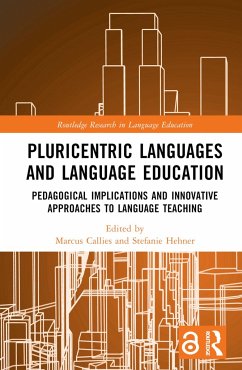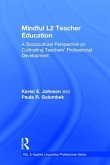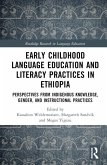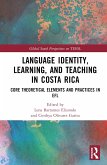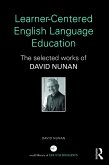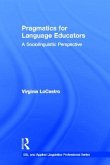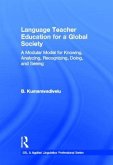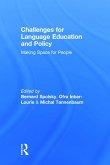Pluricentric Languages and Language Education
Pedagogical Implications and Innovative Approaches to Language Teaching
Herausgeber: Callies, Marcus; Hehner, Stefanie
Pluricentric Languages and Language Education
Pedagogical Implications and Innovative Approaches to Language Teaching
Herausgeber: Callies, Marcus; Hehner, Stefanie
- Gebundenes Buch
- Merkliste
- Auf die Merkliste
- Bewerten Bewerten
- Teilen
- Produkt teilen
- Produkterinnerung
- Produkterinnerung
This book maps out the pedagogical implications of the global spread and diversification of pluricentric languages for language education and showcases new approaches that can take account of linguistic diversity.
Andere Kunden interessierten sich auch für
![Mindful L2 Teacher Education Mindful L2 Teacher Education]() Karen E JohnsonMindful L2 Teacher Education233,99 €
Karen E JohnsonMindful L2 Teacher Education233,99 €![Early Childhood Language Education and Literacy Practices in Ethiopia Early Childhood Language Education and Literacy Practices in Ethiopia]() Early Childhood Language Education and Literacy Practices in Ethiopia179,99 €
Early Childhood Language Education and Literacy Practices in Ethiopia179,99 €![Language Identity, Learning, and Teaching in Costa Rica Language Identity, Learning, and Teaching in Costa Rica]() Language Identity, Learning, and Teaching in Costa Rica190,99 €
Language Identity, Learning, and Teaching in Costa Rica190,99 €![Learner-Centered English Language Education Learner-Centered English Language Education]() David NunanLearner-Centered English Language Education222,99 €
David NunanLearner-Centered English Language Education222,99 €![Pragmatics for Language Educators Pragmatics for Language Educators]() Virginia LocastroPragmatics for Language Educators243,99 €
Virginia LocastroPragmatics for Language Educators243,99 €![Language Teacher Education for a Global Society Language Teacher Education for a Global Society]() B. KumaravadiveluLanguage Teacher Education for a Global Society254,99 €
B. KumaravadiveluLanguage Teacher Education for a Global Society254,99 €![Challenges for Language Education and Policy Challenges for Language Education and Policy]() Challenges for Language Education and Policy222,99 €
Challenges for Language Education and Policy222,99 €-
-
-
This book maps out the pedagogical implications of the global spread and diversification of pluricentric languages for language education and showcases new approaches that can take account of linguistic diversity.
Produktdetails
- Produktdetails
- Verlag: Taylor & Francis Ltd (Sales)
- Seitenzahl: 224
- Erscheinungstermin: 29. November 2022
- Englisch
- Abmessung: 234mm x 156mm x 14mm
- Gewicht: 517g
- ISBN-13: 9781032156965
- ISBN-10: 1032156961
- Artikelnr.: 65614850
- Verlag: Taylor & Francis Ltd (Sales)
- Seitenzahl: 224
- Erscheinungstermin: 29. November 2022
- Englisch
- Abmessung: 234mm x 156mm x 14mm
- Gewicht: 517g
- ISBN-13: 9781032156965
- ISBN-10: 1032156961
- Artikelnr.: 65614850
Marcus Callies is Professor and Chair of English Linguistics, University of Bremen, Germany. Stefanie Hehner is a doctoral candidate in the research project "Varieties of English in Foreign Language Teacher Education", University of Bremen, Germany.
1. Introduction: Pluricentric Languages and Language Education -
Implications and Innovations Part I: Pluricentricity and Language Teaching:
Addressing a Conceptual Interface 2. Pluricentric Languages and the
Teaching of Spanish and French: Strengthening Disciplinary Links 3.
Integrating Linguistic Diversity into English Language Teaching: Challenges
in Implementing a Pluricentric Approach 4. Transfering Pluricentric
Approaches from the Teaching of Portuguese and Vietnamese: A Comparative
Approach to Dealing with Dialectal Variation in School Languages Part II:
Pluricentric Languages and Aspects of Linguistic Variation in Language
Education: Awareness, Beliefs, and Attitudes 5. Moving from Awareness and
Understanding to Tolerance and Promotion? On Spanish Teacher Students'
Knowledge of and Attitudes Towards Language Variation 6. Pre-service
Teachers and Their Awareness of Varieties of Spanish 7. Specific
Preferences vs. Inclusive Foreign Language Education: (Pre-service)
Teachers' Implicit Attitudes Towards Varieties of English 8. Encounters
with Englishes: Language Learning Biographies as a Window to Teacher
Students' Cognitions 9. Creating Awareness of Pluricentricity at University
Language Departments: A Case Study of Dutch Part III: New Approaches to
Teaching and Learning Pluricentric Languages 10. German as a Pluricentric
Language in Teacher Education at the Universities of Rio de Janeiro 11.
Language Corpora and the Teaching and Learning of English as an
International Language 12. Pluricentric Language Teaching and World
Englishes-informed Curriculum Design for Teacher Training Programs 13.
Pluricentric Languages in University Teacher Education: Towards Increased
Curricular Coherence Afterword: Who Is Afraid of Pluricentric Perspectives?
Implications and Innovations Part I: Pluricentricity and Language Teaching:
Addressing a Conceptual Interface 2. Pluricentric Languages and the
Teaching of Spanish and French: Strengthening Disciplinary Links 3.
Integrating Linguistic Diversity into English Language Teaching: Challenges
in Implementing a Pluricentric Approach 4. Transfering Pluricentric
Approaches from the Teaching of Portuguese and Vietnamese: A Comparative
Approach to Dealing with Dialectal Variation in School Languages Part II:
Pluricentric Languages and Aspects of Linguistic Variation in Language
Education: Awareness, Beliefs, and Attitudes 5. Moving from Awareness and
Understanding to Tolerance and Promotion? On Spanish Teacher Students'
Knowledge of and Attitudes Towards Language Variation 6. Pre-service
Teachers and Their Awareness of Varieties of Spanish 7. Specific
Preferences vs. Inclusive Foreign Language Education: (Pre-service)
Teachers' Implicit Attitudes Towards Varieties of English 8. Encounters
with Englishes: Language Learning Biographies as a Window to Teacher
Students' Cognitions 9. Creating Awareness of Pluricentricity at University
Language Departments: A Case Study of Dutch Part III: New Approaches to
Teaching and Learning Pluricentric Languages 10. German as a Pluricentric
Language in Teacher Education at the Universities of Rio de Janeiro 11.
Language Corpora and the Teaching and Learning of English as an
International Language 12. Pluricentric Language Teaching and World
Englishes-informed Curriculum Design for Teacher Training Programs 13.
Pluricentric Languages in University Teacher Education: Towards Increased
Curricular Coherence Afterword: Who Is Afraid of Pluricentric Perspectives?
1. Introduction: Pluricentric Languages and Language Education -
Implications and Innovations Part I: Pluricentricity and Language Teaching:
Addressing a Conceptual Interface 2. Pluricentric Languages and the
Teaching of Spanish and French: Strengthening Disciplinary Links 3.
Integrating Linguistic Diversity into English Language Teaching: Challenges
in Implementing a Pluricentric Approach 4. Transfering Pluricentric
Approaches from the Teaching of Portuguese and Vietnamese: A Comparative
Approach to Dealing with Dialectal Variation in School Languages Part II:
Pluricentric Languages and Aspects of Linguistic Variation in Language
Education: Awareness, Beliefs, and Attitudes 5. Moving from Awareness and
Understanding to Tolerance and Promotion? On Spanish Teacher Students'
Knowledge of and Attitudes Towards Language Variation 6. Pre-service
Teachers and Their Awareness of Varieties of Spanish 7. Specific
Preferences vs. Inclusive Foreign Language Education: (Pre-service)
Teachers' Implicit Attitudes Towards Varieties of English 8. Encounters
with Englishes: Language Learning Biographies as a Window to Teacher
Students' Cognitions 9. Creating Awareness of Pluricentricity at University
Language Departments: A Case Study of Dutch Part III: New Approaches to
Teaching and Learning Pluricentric Languages 10. German as a Pluricentric
Language in Teacher Education at the Universities of Rio de Janeiro 11.
Language Corpora and the Teaching and Learning of English as an
International Language 12. Pluricentric Language Teaching and World
Englishes-informed Curriculum Design for Teacher Training Programs 13.
Pluricentric Languages in University Teacher Education: Towards Increased
Curricular Coherence Afterword: Who Is Afraid of Pluricentric Perspectives?
Implications and Innovations Part I: Pluricentricity and Language Teaching:
Addressing a Conceptual Interface 2. Pluricentric Languages and the
Teaching of Spanish and French: Strengthening Disciplinary Links 3.
Integrating Linguistic Diversity into English Language Teaching: Challenges
in Implementing a Pluricentric Approach 4. Transfering Pluricentric
Approaches from the Teaching of Portuguese and Vietnamese: A Comparative
Approach to Dealing with Dialectal Variation in School Languages Part II:
Pluricentric Languages and Aspects of Linguistic Variation in Language
Education: Awareness, Beliefs, and Attitudes 5. Moving from Awareness and
Understanding to Tolerance and Promotion? On Spanish Teacher Students'
Knowledge of and Attitudes Towards Language Variation 6. Pre-service
Teachers and Their Awareness of Varieties of Spanish 7. Specific
Preferences vs. Inclusive Foreign Language Education: (Pre-service)
Teachers' Implicit Attitudes Towards Varieties of English 8. Encounters
with Englishes: Language Learning Biographies as a Window to Teacher
Students' Cognitions 9. Creating Awareness of Pluricentricity at University
Language Departments: A Case Study of Dutch Part III: New Approaches to
Teaching and Learning Pluricentric Languages 10. German as a Pluricentric
Language in Teacher Education at the Universities of Rio de Janeiro 11.
Language Corpora and the Teaching and Learning of English as an
International Language 12. Pluricentric Language Teaching and World
Englishes-informed Curriculum Design for Teacher Training Programs 13.
Pluricentric Languages in University Teacher Education: Towards Increased
Curricular Coherence Afterword: Who Is Afraid of Pluricentric Perspectives?

